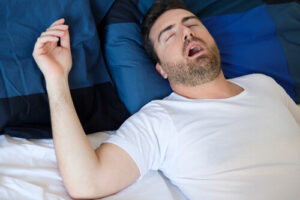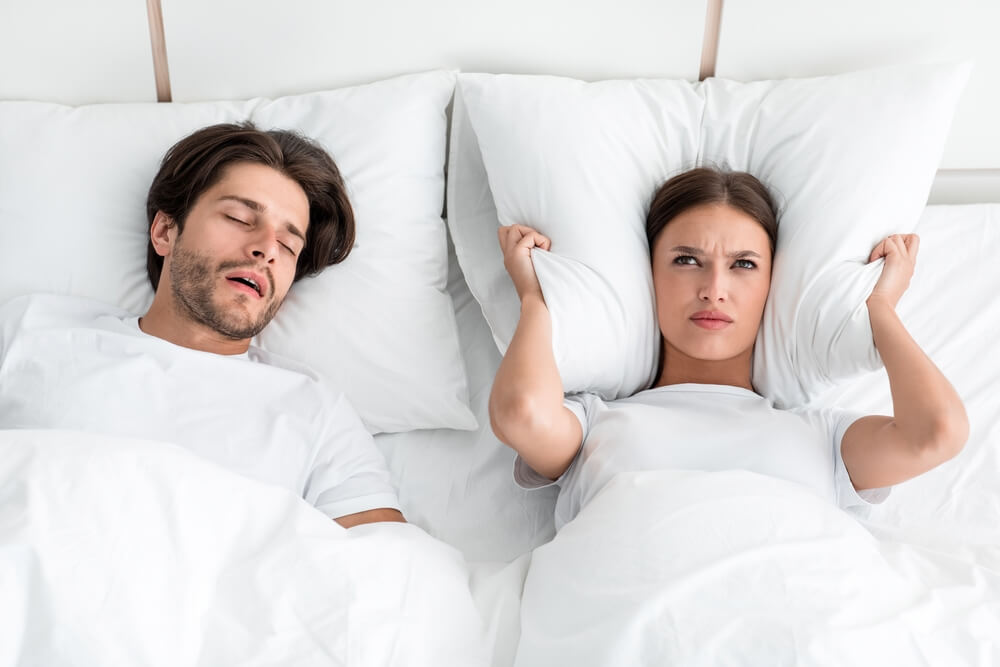Snoring and teeth grinding, medically known as bruxism, are two prevalent sleep-related disorders that can significantly impact an individual’s quality of life and overall health. While snoring results from the partial blockage of airways during sleep, causing vibrations that manifest as loud noises, teeth grinding is a subconscious clenching or grinding of the teeth, often linked to stress, anxiety, or an abnormal bite. Although snoring and teeth grinding may seem unrelated, these conditions often coexist, exacerbating sleep disruption and other health complications. Understanding their causes, effects, and potential treatments is key to addressing these common yet often overlooked health concerns.
What are Snoring and Teeth Grinding?
Snoring is a common condition that can affect people of all ages, although it tends to occur more frequently in men and people who are overweight. It happens when airflow through the mouth and nose is physically obstructed during sleep. This blockage can occur in the nasal airway, the throat, or by the tongue’s position, causing the surrounding tissues to vibrate, producing the familiar sound of snoring. Factors contributing to snoring include age, nasal and sinus problems, being overweight, alcohol and smoking, and sleep posture. While it’s often seen as a mere annoyance for the bed partner, chronic snoring may indicate a more serious condition, such as obstructive sleep apnea requiring medical attention.
Teeth grinding, or bruxism, is an oral parafunctional activity that involves clenching or grinding your teeth, typically during sleep. However, it can also occur during the day, often subconsciously in response to stress and anxiety. Bruxism can lead to problems such as jaw disorders, headaches, and damaged teeth. It’s often related to factors like stress, anxiety, abnormal alignment of upper and lower teeth (malocclusion), sleep disorders such as sleep apnea, and certain lifestyle factors like alcohol consumption and smoking. In many cases, people with bruxism are unaware they have the condition unless informed by a sleep partner or identified by a dentist who notices telltale signs of tooth wear.
Causes of Snoring
Snoring is typically caused by the physical obstruction of airflow in some part of the nose, throat, or mouth. Various factors contribute to this:
- Anatomy of Mouth: Those with a low, thick, soft palate, or those who are overweight and have extra tissues in the back of their throat, can have narrower airways. A long uvula or tonsils can also obstruct the airflow.
 Nasal Problems: Chronic nasal congestion or a deviated nasal septum (the wall separating one nostril from the other) may require extra effort to pull air through the nose, creating an exaggerated vacuum in the throat that tightens together the floppy tissues of the throat, resulting in snoring.
Nasal Problems: Chronic nasal congestion or a deviated nasal septum (the wall separating one nostril from the other) may require extra effort to pull air through the nose, creating an exaggerated vacuum in the throat that tightens together the floppy tissues of the throat, resulting in snoring.- Alcohol Consumption and Sedatives: Alcohol and certain medications can lead to deeper sleep and worsening snoring. They relax the throat and tongue muscles, causing them to collapse into the airway.
- Sleep Position: Sleeping flat on your back can cause the flesh of your throat to relax and block the airway.
- Sleep Apnea: Snoring can be a major symptom of obstructive sleep apnea. In this serious sleep disorder, breathing repeatedly stops and starts throughout sleep due to complete or partial blockages in the airway.
Causes of Teeth Grinding (Bruxism)
The exact cause of bruxism is not entirely known, but it’s generally believed to be a combination of physical, psychological, and genetic risk factors.
- Stress and Anxiety: This is a major contributor, as teeth grinding often occurs during high-stress or anxiety periods.
- Abnormal Bite: A malocclusion or misaligned teeth can lead to grinding or clenching.
- Sleep Disorders: Other sleep-related disorders, such as sleep apnea, are strongly associated with bruxism.
- Personality Type: Certain personality types, such as those who are competitive, hyperactive, or aggressive, are more prone to bruxism.
- Lifestyle Factors: Smoking, heavy alcohol consumption, caffeine, and certain medications (particularly selective serotonin reuptake inhibitors, a common type of antidepressant) can increase the risk of bruxism.
- Genetics: Bruxism tends to run in families, suggesting a genetic predisposition.
It’s important to note that these conditions may exist with no obvious cause in many cases and could be a combination of factors. Always consult a healthcare provider for a proper diagnosis and treatment options.
Symptoms of Snoring and Teeth Grinding
While the most apparent symptom of snoring is the loud noise produced during sleep, other signs and symptoms may include:
- Excessive daytime sleepiness
- Difficulty concentrating
- Morning headaches
- Sore throat upon awakening
- Restless sleep
- Gasping or choking at night
- High blood pressure
- Chest pain at night
In severe cases, snoring could indicate a sleep-related breathing disorder called Obstructive Sleep Apnea syndrome (OSA), a serious condition characterized by repeated episodes of stopped or shallow breathing during sleep.
Bruxism often happens during sleep, so many people aren’t aware they have the condition. However, there are signs and symptoms which can help identify the state:
- Teeth grinding or clenching, which may be loud enough to awaken your sleep partner
- Teeth that are flattened, fractured, chipped or loose
- Increased tooth sensitivity
- A jaw or face pain or soreness
- Tired or tight jaw muscles
- Pain that feels like an earache, though it’s not a problem with your ear
- Dull headache originating in the temples
- Damage from chewing on the inside of your cheek
- Sleep disruption
In severe cases, bruxism can lead to temporomandibular joint (TMJ) disorders, changes in facial appearance, and damage to the teeth.
If you notice any of these symptoms, it’s a good idea to consult a healthcare provider or a dentist, as these conditions can have long-term health effects if left untreated.
Treatment Options for Snoring
The appropriate treatment for snoring varies, depending on the cause of the problem. Identifying the specific cause of sleep-disordered breathing is crucial before treatment can be effectively prescribed. Here are some treatment options:
- Lifestyle Changes: Weight loss (if overweight), exercise, avoiding alcohol and sedatives, quitting smoking, and establishing regular sleep patterns can help reduce snoring. Moreover, avoiding caffeine and implementing stress management techniques can all help reduce teeth grinding.
 Sleeping Position: Changing the sleep position can prevent snoring. Lying on one’s side is typically recommended.
Sleeping Position: Changing the sleep position can prevent snoring. Lying on one’s side is typically recommended.- Oral Appliances: Dentists can design custom-fit oral appliances that help keep the airway open during sleep. These devices reposition the tongue or lower jaw to facilitate better airflow.
- Continuous Positive Airway Pressure (CPAP): This is commonly used to treat sleep apnea but can also help with snoring. The user wears a mask over the nose and/or mouth, and a machine gently blows air into the throat to keep the airway open.
- Surgery: Various surgical procedures can increase the size of the airway, thereby reducing snoring. These may involve removing excess tissue in the throat, correcting nasal deformities, or changing the jaw’s position.
- Nasal Devices or Medications: These can be used to treat snoring caused by nasal congestion.
Treatment Options for Teeth Grinding (Bruxism):
Many cases of bruxism do not require treatment. However, if the problem is severe, options might include:
- Dental Approaches: A dentist can fit you with a mouth guard or dental splint that separates the upper and lower teeth and prevents them from grinding against each other.
- Behavioral Therapies: Cognitive-behavioral therapy can help a person understand and manage the stress or anxiety that often contributes to bruxism.
- Medication: There isn’t a definitive medication to stop bruxism, but doctors may suggest certain drugs for short-term use, like muscle relaxants before sleep or Botox injections into the jaw muscle to weaken it and prevent grinding.
- Physical Therapy: Exercises to stretch and relax the jaw muscles can be beneficial. Some people find relief from complementary approaches, like yoga, massage, and acupuncture.
Both snoring and bruxism may be signs of other health problems, so it’s important to consult a healthcare provider or dentist if you’re experiencing these issues.
Tips to Manage Snoring and Teeth Grinding at Home
Managing Snoring:
- Sleep Position: Sleeping on your back can cause your tongue and soft palate to press against the back of your throat, leading to snoring. Try sleeping on your side instead.
- Weight Management: If you’re overweight or obese, losing weight can reduce the amount of tissue in your throat that might be causing your snoring.
- Avoid Alcohol and Sedatives: These substances relax the muscles in your throat, increasing the likelihood of snoring.
- Regular Sleep Routine: Establish a regular sleep schedule, and stick to it. This can help you have more restful, quality sleep which might reduce snoring.
- Keep Nasal Passages Open: If your snoring is due to a stuffy nose or sinus congestion, keeping your nasal passages open can help. You can use decongestants, nasal strips, or a neti pot to rinse your nasal passages.
Managing Teeth Grinding:
- Stress Reduction: Since stress and anxiety are significant contributors to teeth grinding, strategies to reduce stress, like meditation, deep breathing, yoga, and other relaxation techniques, can be beneficial.
- Avoid Stimulants: Stimulants, such as caffeine and alcohol, can increase grinding, so it’s a good idea to limit these, particularly before bedtime.
- Regular Sleep Routine: Similar to snoring, a consistent sleep schedule can lead to better sleep quality and potentially reduce teeth grinding.
- Conscious Awareness: During the day, try to be aware of your oral habits, especially if you tend to clench your jaw or grind your teeth while concentrating or when stressed.
- Over-the-Counter Dental Guards: You can get a dental guard or mouth splint from a pharmacy to protect your teeth from grinding during sleep. Although they may not fit as well as the ones from your dentist, they can provide temporary relief.
Remember, while these tips can help manage symptoms, they might not address underlying causes. If symptoms persist, seeking professional medical advice to treat and manage these conditions effectively is crucial.
When it’s Time to See a Doctor for Snoring or Teeth Grinding
While snoring and teeth grinding might seem like minor issues, they can be signs of more serious health problems. It’s important to know when to consult a healthcare professional.
For Snoring:
 You should see a doctor if:
You should see a doctor if:
- You snore loudly and heavily and are tired during the day.
- You stop breathing, gasping, or choking during sleep.
- You fall asleep at inappropriate times, such as during a conversation or a meal.
These could be signs of a potentially serious condition like sleep apnea, which can increase the risk of high blood pressure, heart conditions, and stroke.
For Teeth Grinding:
You should see a dentist or doctor if:
- You wake up with dull headaches or a sore jaw regularly.
- Your partner hears you grinding your teeth during the night.
- You notice your teeth are worn down, damaged, or sensitive.
- You have pain in your jaw, face, or ear.
- You have difficulty opening and closing your mouth fully.
Chronic teeth grinding can lead to fracturing, loosening, or loss of teeth. It can wear teeth down, affect your jaws, cause or worsen temporomandibular joint (TMJ) disorders, and even change the appearance of your face.
Remember, early detection and management of these conditions can help prevent complications, so it’s crucial to seek professional help if you’re experiencing these symptoms.
References:
https://www.proteethguard.com/blog/snoring-and-teeth-grinding/
https://www.ncbi.nlm.nih.gov/pmc/articles/PMC7731201/
https://www.mayoclinic.org/diseases-conditions/bruxism/symptoms-causes/syc-20356095
https://www.sleepfoundation.org/sleep-apnea/link-between-sleep-apnea-and-teeth-grinding
https://www.healthline.com/health/mouth-guard
